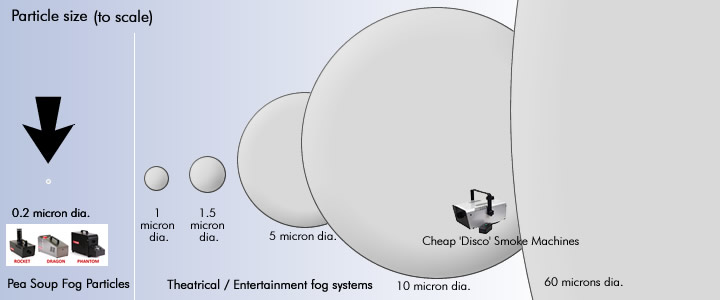Products
Smoke Machines
Hazers
Specialist
Smoke Fluid
Special Effects
By Application
Sales
How to order
Q & A Info
About us
Who we are
Contact
Your Basket 


|
 |
 |
Smoke Particle Size - why smaller is better!
Common to this range of smoke generators is our incorporation
of precision, machined, specially treated steel heat exchanger blocks
in which the smoke chemical is vaporised.
Conventional smoke generators normally use either
cast or platen type aluminium heat exchangers, which whilst very
cost effective to make, generally produce a smoke particle with
a mass median diameter (mmd) of 1 - 10 microns.
This compares with a typical particle size of just
0.2 - 0.3 micron mmd for our smoke systems below, be they water
or oil based.
The general benefits of producing such a consistent
and clearly defined particle distribution are:
- the smaller the particle size of the smoke, (or
more accurately fog) the smaller the amount of chemical is required
within the atmosphere to achieve any given visibility. This can
have a significant effect on running costs for heavy users of
artificial smoke (fire brigades etc.)
- the less the amount of chemical in the atmosphere,
the safer the smoke if measured in terms of relative Occupational
Exposure Levels.
- the smaller the particle size of the smoke,
the lower its settling velocity (the rate at which a particle
will fall, due to gravity). A smoke particle of unit density,
0.2 micron in diameter, will fall at 8mm/hour,
compared to a 2 micron particle, which falls at 468mm/hour. In essence
this means that the smaller the particle of smoke you produce,
the less chance there is that deposition of smoke particles will
occur on surfaces.

Small particle size = no residue!
Size of fog particle
[diameter in microns / µm] |
Setting Velocity due to gravity (millimetres
per hour) |
|
0.2
|
8.14 |
Typical Pea Soup smoke system
particle |
| |
So, in 2 hours (the average hang time), a Pea
Soup smoke particle will only have fallen 1.6cm. |
|
|
125.28 |
Typical
particle size for a cast heat exchanger block [virtually all
'theatrical / entertainment' smoke machines] |
| 2 |
468.00 |
| 3 |
1,026.00 |
| 4 |
1,800.00 |
| 5 |
2,793.60 |
| 6 |
3,996.00 [4 metres] |
Manufacturers'
quoted particle size of cast heater blocks when pumping smoke
at high output (wet smoke) |
| 8 |
7,056.00 [7.05 metres] |
| 10 |
11,016.00 [11 metres] |
| 20 |
43,560.00 [43.5 metres] |
| 30 |
97,920.00 [97.9 metres] |
An artificial smoke particle increases rapidly with
particle size. The settling velocity is proportional to the square
of the particles diameter.
The terminal settling velocity of an aerosol or "artificial
smoke" particle increases rapidly with particle size. The settling
velocity is proportional to the square of the particle diameter,
although sub micron particles, such as those produced by Pea Soup
branded smoke systems require the use of slip correction factors.
Calculated for standard density spheres
at 293 K [20° C] and 101 kPa (1 atm).
"Aerosol Technology", William C. Hinds, Wiley-Interscience,
1999
|
Rocket
Hand Portable Smoke Machine - hand-portable unit.
Can deliver quick dispersing smoke (PS21) or long lasting (PS23).
Off-power facility. 240/110v. |
|
Dragon
2.2kW High Output Smoke Generator - continuous
high output 2.2kW machine with a choice of fluids available
for either quick dispersing smoke or persistent. 240/110v. |
|
Oil Based Smoke Generator - oil-based smoke machines
with continuous highly controllable output. The generated smoke
can withstand high temperatures, is very persistent and has
a very small particle size (no residue) and can easily be ducted.
240/110v. |

The Oil Based Smoke
Generator in operation
|



